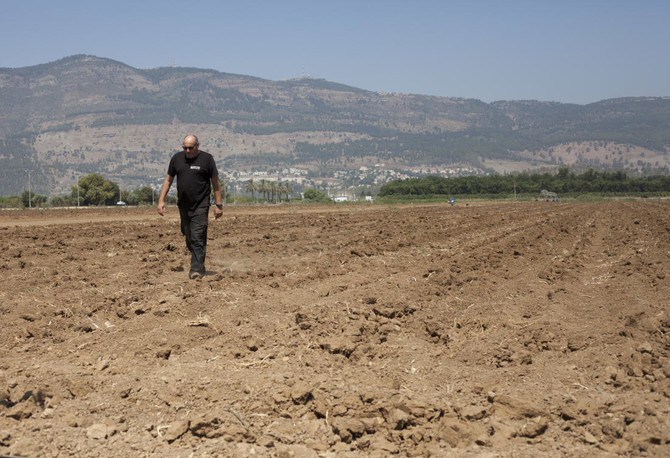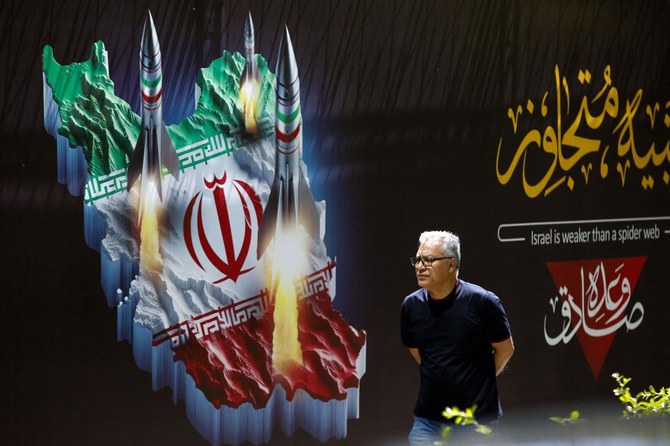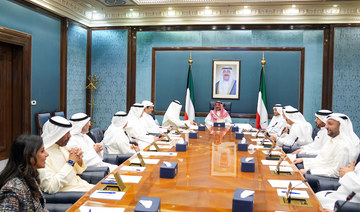KFAR YUVAL, Israel: For years, public service announcements warned Israelis to save water: Take shorter showers. Plant resilient gardens. Conserve. Then Israel invested heavily in desalination technology and professed to have solved the problem by tapping into the abundant waters of the Mediterranean Sea. The once ubiquitous conservation warnings vanished.
Now, a five-year drought is challenging that strategy, as farmers struggle and the country’s most important bodies of water shrink.
It’s a confounding situation for a country that places itself on the forefront of desalination technology in an arid region, where water is a key geostrategic issue that has its own clauses in peace agreements.
“Nobody expected five years of drought in a row, so despite our desalination capacity, it’s still a very, very grave situation,” said Yuval Steinitz, Israel’s minister of energy.
Some say Israel’s technological prowess may not be enough to overcome the forces of nature.
Situated in the heart of the Middle East, Israel is in one of the driest regions on earth, traditionally relying on a short rainy season each winter to replenish its limited supplies.
Years of decreased rainfall have reduced the Sea of Galilee, Israel’s main natural water source, to some of its lowest recorded levels, and Israel has stopped pumping water from it to its national system.
The current drought has also dried out some tributaries that feed into the Jordan River, which flows south into the Sea of Galilee then squiggles 220 miles (360 kilometers) to the lowest place on Earth, the Dead Sea.
The biblical bodies of water are crucial to the survival and stability of Israel, Jordan and the Palestinian territories, but they are increasingly drying up, largely due to climate change, growing populations and the greater use of water for agriculture.
In a bid to achieve water security, Israel has opened five desalination plants since 2005 and plans to expand that effort in the coming years. Roughly 40 percent of Israel’s drinking-quality water now comes from desalination and is expected to hit 70 percent in 2050.
When the drought was in its infancy, Israel greeted it with a shrug, pointing to its massive investment in desalination. But the tone has changed recently, and over the last few months a televised ad again has pleaded with Israelis to save water because — rehashing a tagline from previous campaigns — “Israel is drying up.”
Critics say water conservation — a crucial measure in semi-arid Israel — has been sidelined in favor of desalination.
“Israel definitely put conservation on the backburner. As soon as desalination plants were up and running there was this false sense of security,” and water consumption rose, said Sarit Caspi-Oron, director of the water department at the Israel Union for Environmental Defense, an advocacy group.
“Desalination doesn’t make up for everything, and when groundwater is suffering from drought and the Sea of Galilee is suffering from drought, you need to conserve,” said Caspi-Oron.
In the past, Israel has imposed taxes on water use during droughts and has promoted the use of water-saving devices. But there are no plans so far to pursue the measures this time around.
Desalinated water reaches Israeli households in the country’s most populated region along the coast as well as some inland residents. But in northern Israel, residents still rely on rapidly shrinking natural sources. So far, their intake has not been limited.
Once bubbling brooks in Israel’s north have been reduced to a trickle. Officials at the historic Tel Dan nature reserve say the springs there will be dry within two months, which could negatively affect tourism in the region.
Among the first to feel the drought’s sting have been farmers in Israel’s Galilee region. Israel has imposed a limit on the amount of water they can use, which has threatened an already tenuous livelihood and forced many to rethink their crops.
Israeli farmer Ofer Moskovitz can typically grow more than one crop each year, but for the first time he has chosen not to plant his wheat crops and is only growing avocados. Even that change is proving a challenge.
“If I don’t water the avocado trees for one day they start getting weak. If I don’t water them for a year, 20 years would go down the drain,” he said.
The existing infrastructure makes it impossible to deliver desalinated water to farmers in the north, said Caspi-Oron.
There are other reasons not to bank on desalination. The plants require immense amounts of energy and are costly to build and operate. Relying so heavily on desalination also creates a potential security risk, as an attack on the plants could potentially knock out large portions of the country’s water supply.
Still, Israel is keeping the technology a priority. The government passed a plan in June to tackle the drought, with its first objective to increase the amount of desalinated water. It also called for springs and tributaries to be rehabilitated and plans to add desalinated water to the Sea of Galilee starting next year, despite criticism from some that this could disturb the balance of minerals in the lake.
Israel is optimistic that the drought can be addressed with a little ingenuity.
The drought “will be solved, there is no question,” Steinitz, the energy minister, said. “This area is not new for us. We simply resume our historic tradition to focus and find developing water solutions.”
5-year drought raises questions over Israel’s water strategy
5-year drought raises questions over Israel’s water strategy

- It’s a confounding situation for a country that places itself on the forefront of desalination technology in an arid region
- The current drought has also dried out some tributaries that feed into the Jordan River
Kuwait economic fund signs coordination MoU with ILO

- MoU aims to coordinate joint actions in economic and social development in developing countries
WASHINGTON: The Kuwait Fund for Arab Economic Development has agreed a memorandum of understanding with the International Labor Organization to enhance development cooperation, Kuwait News Agency reported.
The MoU was signed by KFAED Acting Director General Waleed AI-Bahar and ILO Assistant Director General for External and Corporate Relations Laura Thompson on the sidelines of the 2024 spring meetings of the International Monetary Fund and World Bank in Washington DC.
The MoU establishes a framework for technical cooperation and aims to coordinate joint actions in economic and social development in developing countries. This includes exchanging expertise and information in economic, financial and commercial sectors.
The five-year renewable agreement focuses on collaborative activities aligned with the goals of both organizations in the countries in which they operate. The partnership will also involve sharing resources in areas of mutual interest such as statistics, policy enhancement, youth economic empowerment, gender equality at work, crisis response and South-South cooperation.
Regular consultations are planned to ensure effective coordination of operations in the targeted nations.
International reactions after Israel’s reported attack on Iran

- Widespread calls for utmost restraint between Iran and Israel to avoid serious repercussions
PARIS: Here are some international reactions Friday after Israel’s reported attack on the Iranian province of Isfahan, where it has military bases and nuclear facilities:
UN SECRETARY-GENERAL ANTONIO GUTERRES
UN Secretary-General Antonio Guterres reiterated that it was “high time to stop the dangerous cycle of retaliation in the Middle East,” his spokesperson said in a statement.
“The Secretary-General condemns any act of retaliation and appeals to the international community to work together to prevent any further development that could lead to devastating consequences for the entire region and beyond,” Stephane Dujarric said.
RUSSIA
Russia has made clear to Israel that Iran “does not want escalation,” Moscow’s foreign minister Sergei Lavrov said Friday, after reports Israel had carried out retaliatory strikes against its arch-rival.
“There have been telephone contacts between the leadership of Russia and Iran, our representatives and the Israelis. We made it very clear in these conversations, we told the Israelis that Iran does not want escalation,” Lavrov said in an interview with Russian radio stations.
UAE
The United Arab Emirates’ foreign ministry on Friday expressed concern about regional tensions in a statement, calling for ‘utmost restraint’ to avoid serious repercussions.
JORDAN
Jordan’s Foreign Minister Ayman Safadi said on Friday Israeli-Iranian retaliations must end, warning against danger of regional escalation.
GERMANY
German Chancellor Olaf Scholz called for de-escalation following a strike on the Iranian city of Isfahan and said Berlin would work with its partners in this direction.
“De-escalation remains the order of the day in the near future. And we will also talk about this with all our friends and allies, and work together with them in this direction,” Scholz told reporters on Friday.
G7
G7 foreign ministers Friday urged “all parties” to “work to prevent further escalation” in the Middle East, following reports that Israel had carried out revenge strikes on Iran.
“In light of reports of strikes on April 19th, we urge all parties to work to prevent further escalation. The G7 will continue to work to this end,” the Group of Seven industrialized nations said in a statement.
The ministers from Italy, the UK, US, France, Germany, Japan and Canada said they “demand that Iran and its affiliated groups cease their attacks”.
SPAIN
Spanish Prime Minister Pedro Sanchez called Friday for all sides to avoid “an escalation of the conflict in the Middle East” after reports that Israel carried out retaliatory strikes on Iran.
“We must avoid any action that would lead to an escalation of the conflict in the Middle East. The seriousness of the moment demands responsibility and restraint from all parties,” he wrote on X.
JAPAN’S CHIEF CABINET SECRETARY YOSHIMASA HAYASHI
“Japan is deeply concerned about the situation in the Middle East and strongly condemn any actions that lead to the escalation of the situation.
“Japan will continue to make all necessary diplomatic efforts to prevent the situation from worsening further.”
CHINA
“China opposes any actions that further escalate tensions and will continue to play a constructive role to de-escalate the situation,” said foreign ministry spokesman Lin Jian.
IAEA
“IAEA can confirm that there is no damage to Iran’s nuclear sites. Director General Rafael Grossi continues to call for extreme restraint from everybody and reiterates that nuclear facilities should never be a target in military conflicts. IAEA is monitoring the situation very closely,” the International Atomic Energy Agency said on X.
OMAN
“The Sultanate of Oman is following the continuing tension in the region and condemns the Israeli attack this morning on Isfahan,” the foreign ministry said, adding that it also “condemns and denounces Israel’s repeated military attacks in the region.
“Oman once again appeals to the international community to address the causes and roots of tension and conflict through dialogue, diplomacy and political solutions, and to focus on ceasefire efforts in Gaza and resort to international law and United Nations resolutions to reach a just and lasting solution to the Palestinian issue.”
EC PRESIDENT URSULA VON DER LEYEN
“We have to do everything possible (so) that all sides restrain from the escalation in that region ... It is absolutely necessary that the region stays stable and that all sides refrain from further action,” European Commission president Ursula von der Leyen.
UK
“We have condemned Iran’s reckless and dangerous barrage of missiles against Israel on Saturday and Israel absolutely has a right to self-defense. But as I said to Prime Minister Netanyahu when I spoke to him (this week) and more generally, significant escalation is not in anyone’s interest, what we want to see is calm heads prevail across the region,” Prime Minister Rishi Sunak said.
ITALY
“We invite everyone to be cautious to avoid an escalation,” Foreign Minister Antonio Tajani told RAI news on Capri where Italy is hosting a meeting of foreign ministers from the Group of Seven nations.
“This is something we from the government’s side take very seriously and are following very closely,” Foreign Minister Tobias Billstrom said.
“There has to be an end to the exchange of blows and escalation.”
Gazans cool down in seawater despite nearby Israeli vessels

- Soaring temperatures in the embattled Palestinian enclave have prompted Gazan children to resort to the sea
RAFAH: Soaring temperatures in Gaza during the past week have driven thousands in the enclave’s southern city of Rafah to seek respite on beaches.
The proximity to Israeli military vessels did not stop hundreds of war-weary Gazans from bringing their children to enjoy a day of paddling and swimming, according to Arab News’ reporter in the embattled Palestinian enclave.
Many of the 1.4 million displaced Palestinians in Rafah live in makeshift shelters, including tents, on the beach, near the Egyptian border.
Since the Israeli onslaught on the Gaza Strip broke out on Oct. 7 last year, Gazans have been forced to resort to salty seawater for washing, bathing and even drinking due to the collapse of the water system.
Dubai carrier Emirates suspends check-in for onward connections, flydubai cancels Iran flights

- Dubai International Airport temporarily limiting the number of arriving flights for 48 hours from 12 p.m. on Friday
DUBAI: Dubai’s flagship airline Emirates is suspending check-in for all customers with onward connections through the city until 2359 GMT on Friday, three days after a record storm swept the United Arab Emirates.
Emirates, one of the world’s biggest international airlines, said customers traveling to Dubai as their final destination may check-in and travel as usual.
The suspension shows the airline and its hub, Dubai International Airport, are still struggling to clear a backlog of flights after the UAE saw its heaviest rains in the 75 years records have been kept, bringing much of the country to a standstill for two days and causing significant damage.
Dubai International airport, one of the world’s busiest, later said it was temporarily limiting the number of arriving flights for 48 hours from 12 p.m. on Friday to speed up recovery operations from rain and flooding.
Thousands of passengers have been affected by flight cancelations this week, Dubai Airports Chief Executive Paul Griffiths told local radio station Dubai Eye on Friday, after the storm flooded taxiways.
The storm, which hit neighboring Oman on Sunday, pounded the UAE on Tuesday, with 20 reported dead in Oman and one in the UAE.
Dubai’s budget carrier flydubai meanwhile canceled flights to Iran on Friday after receiving an official alert, a statement said.
“In line with the issued NOTAM (notice to air missions), our flights to Iran today have been canceled,” said the statement.
One flight which had already departed for Tehran returned to Dubai after the Iranian capital’s airport was closed, it added.
Flights were suspended across swathes of Iran as Iranian state media reported explosions in the central province of Isfahan.
Flight-tracking software showed commercial flights avoiding western Iran, including Isfahan, and skirting Tehran to the north and east.
The main road that connects the UAE’s most populous emirate Dubai with Abu Dhabi remains partially closed, while an alternative route into Dubai requires vehicles to use a road that is entirely covered in floodwater where cars and buses have been abandoned.
In the UAE’s north, including in the emirate of Sharjah, people were reportedly still trapped in their homes, while others there said there had been extensive damage to businesses.
Rains are rare in the UAE and elsewhere on the Arabian Peninsula, which is typically known for its dry desert climate where summer air temperatures can soar above 50 degrees Celsius.
The UAE’s National Center of Meteorology said on social platform X that Monday may see light rainfall by late night and forecast “a chance of light to moderate rainfall, might be heavy at times over some areas” for Tuesday, with a fall in temperatures over some coastal areas.
Iran closes air space, commercial flights diverted after apparent Israeli retaliatory strikes

- Drones shot down over Isfahan, says Iranian state media
- Israel military refuses to comment on incident
DUBAI/WASHINGTON: Israeli missiles have hit a site in Iran, ABC News reported late on Thursday, citing a US official, while Iranian state media reported an explosion in the center of the country, days after Iran launched a retaliatory drone strike on Israel.
Commercial flights began diverting their routes early Friday morning over western Iran without explanation as one semiofficial news agency in the Islamic Republic claimed there had been “explosions” heard over the city of Isfahan.
Some Emirates and Flydubai flights that were flying over Iran early on Friday made sudden sharp turns away from the airspace, according to flight paths shown on tracking website Flightradar24.
“Flights over Isfahan, Shiraz and Tehran cities have been suspended,” state media reported.
Iranian officials said its air defenses did shot down several drones but there had been “no missile attack for now” on the country.
The state-run IRNA news agency reported that Iran fired air defense batteries early Friday morning across several provinces after reports of explosions near the city of Isfahan.
Several drones “have been successfully shot down by the country’s air defense, there are no reports of a missile attack for now,” Iran’s space agency spokesman Hossein Dalirian says on X.
The Fars news agency said “three explosions” were heard near the Shekari army airbase near Isfahan.
Iran’s local media also reported that nuclear facilities in Isfahan were “completely secure” after explosions were heard near the area.
“Nuclear facilities in Isfahan province are completely secure,” Tasnim news agency reports, quoting “reliable sources.”
Israel had said it would retaliate against Iran’s weekend attack, which involved hundreds of drones and missiles in retaliation for a suspected Israeli strike on its embassy compound in Syria. Most of the Iranian drones and missiles were downed before reaching Israeli territory.
Several Iranian nuclear sites are located in Isfahan province, including Natanz, centerpiece of Iran’s uranium enrichment program. Isfahan, Isome 350 kilometers (215 miles) south of Iran’s capital, Tehran, is also home to a major air base for the Iranian military.
Meanwhile in Iraq where a number of Iranian-backed militias are based, residents in Baghdad reported hearing sounds of explosions, but the source of the noise was not immediately clear.
In Syria, a local activist group said strikes hit an army position in the south of the country Friday.
“There were strikes on a Syrian army radar position,” said Rayan Maarouf, who runs the Suwayda24 anti-government website that covers news from Sweida province in the south.
Iranian military positions in Syria had been frequently targetted by Israeli air strikes over the past years. Early this month, an Israeli strike demolished a consular building annex of the Iranian Embassy in Sydia's capital Damascus, killing 13 people, including two generals of Iran's Revolutionary Guards, triggering the Iranian missiles and drones attack on Israel on April 13.
At the United Nations Security Council on Thursday, Iran urged member nations that Israel “must be compelled to stop any further military adventurism against our interests” as the UN secretary-general warned that the Middle East was in a “moment of maximum peril.”
Israel had said it was going to retaliate against Iran’s April 13 missile and drone attack.
Analysts and observers have been raising concerns about the risks of the Israel-Gaza war spreading into the rest of the region.
Oil prices and jumped on the reports of the Israeli strike. Brent crude futures rose 2 percent to $88.86 a barrel, the dollar gained broadly, gold rose 1 percent and S&P 500 futures dropped 1 percent.
Israel’s assault on Gaza began after Palestinian Islamist group Hamas attacked Israel on Oct. 7, killing 1,200, according to Israeli tallies.
Israel’s military offensive has killed over 33,000 Palestinians in Gaza, according to the local health ministry.
Iran-backed groups have declared support for Palestinians, launching attacks from Lebanon, Yemen and Iraq.
















